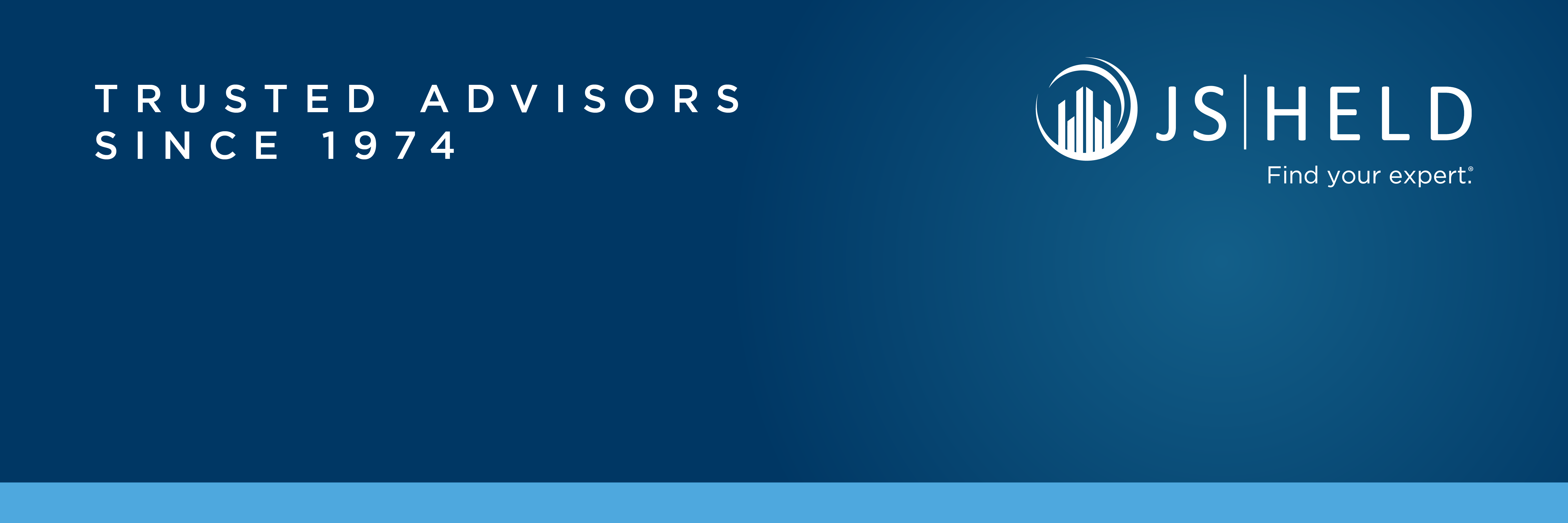Fractured & Fraught — but Still Potentially Profitable: The State of ESG in 2025
Corporate Compliance Insights2025
As we approach the end of 2025, the state of ESG is in flux: Trump Administration executive orders have sought to roll back environmental regulations, while the EU has softened its landmark ESG disclosure requirements and California has pressed on with its similar regulations. As John Peiserich of J.S. Held argues, these developments only increase the complexity and nuance with which corporations must approach striking a balance between profitability and environmental considerations.
View more
2024 J.S. Held Global Risk Report: Environmental, Social & Corporate Governance (ESG)
JD Supra2024
The extraterritorial expansion of ESG laws and policies will reach a significant turning point in 2024. Investors, government regulators, and consumers are demanding greater transparency and disclosure when it comes to a company’s internal ESG policies. Companies are now putting ESG factors into business metrics reflecting material risks to the organization that, when utilized appropriately, should serve as a business improvement tool, and provide others with tracking mechanisms.
View more
Crosscurrents—European Union Fails to Pass Corporate Sustainability Due Diligence Directive & SEC Bails on Scope 3 Requirements
JD Supra2024
With the adoption by 196 parties of the Paris Agreement in December 2015, legally binding international climate change arrived. The Paris Agreement requires increasingly aggressive five-year cycles climate action plans which are submitted on a national basis, all pointed toward limiting global warming to 1.5˚C above pre-industrial levels. The five-year cycles include a “stocktake” or evaluation of the plan success, gaps, and future plans. The UN Climate Change Conference (COP28) served as the conclusion of the first global stocktake, and the results were not positive – the current progress would not meet the global warming limit.
View more
Crosscurrents: The SEC’s Standardized Climate-Related Disclosures as Adopted
JD Supra2024
After a significant delay, the Securities and Exchange Commission (SEC) adopted its final rule on Wednesday, March 5, 2024, that requires companies who file registration statements and annual reports to disclose material climate-related risks. The new rules, which become effective 60 days after publication, are phased in for registrants depending on their filing status, with smaller companies having later compliance dates. As has been well reported, Scope 3 emissions, those greenhouse gas emissions calculated based on activities in a corporate value chain, have been removed from the final rule.
View more
Crosscurrents: California’s Senate Bill 253 Mandates Carbon Reporting for Large Companies
JD Supra2023
California’s Senate Bill 253 introduces mandatory climate disclosure requirements for large companies. Learn about emissions reporting and how Bill 253 leads the way into environmental accountability.
View more
Energy Consumption Analysis: The Impact on Insurance Claims During Extreme Weather Events
JD Supra2023
Water damage to structures is among the most common type of first party property insurance claims. During periods of extreme weather, water damage claims typically increase. Extreme low temperatures in areas of the United States where low temperatures are infrequent combined with higher priced energy or reduced reserves related to ongoing energy transition requirements are affecting operational behaviors of both utilities and consumers.
View more
Rethinking Energy Reliability with Modern Power Systems
Power Magazine2023
As the energy transition to inverter-based resources continues, reliability risk increases and requires additional investment to mitigate threats. But what measures should be put in place, what are the associated costs, and how can the power generation industry budget accordingly?
View more
Crosscurrents: The Uyghur Forced Labor Prevention Act—Sustainability Commitments and Social Regulatory Compliance Drivers
JD Supra2023
Sustainability and environmental, social and governance reporting (ESG”) sometimes have strange bedfellows. The social and governance components of both face ever increasing complexity. Effective June 21, 2022, the Uyghur Forced Labor Prevention Act (the Act) creates a rebuttable presumption that goods mined, produced, or manufactured wholly or in part in the Xinjiang Uyghur Autonomous Region (the Region) of China were made with forced labor, including labor by persecuted minorities in other areas of China, and are therefore ineligible to enter the United States.
View more
Crosscurrents: Corporate Sustainability Reporting Directive (CSRD) & ESG Reporting in Europe
JD Supra2023
In mid-November 2022, the European Parliament adopted the Corporate Sustainability Reporting Directive (CSRD), a major expansion of the 2014 Non-Financial Reporting Directive (NFRD). The new rules will quadruple the number of companies required to provide sustainability disclosures and expand the reporting requirements to non-European companies with a significant presence in the EU. The Council of the European Union, the body of national ministers that adopts laws passed by the European Parliament, ratified this final version on November 11, 2022. Implementation of the directive is to start with larger companies by the beginning of 2024, with rollout to smaller companies over the following two years.
View more
Water Cybersecurity? EPA Mandates Regulations to Prevent Cyberattacks on Public Water Systems
JD Supra2023
EPA Aims to Mitigate Risk of Cyberattack on Public Water Systems
On March 3, 2023, the U.S. Environmental Protection Agency (EPA) issued its Memorandum Addressing Public Water System (PWS) Cybersecurity in Sanitary Surveys or an Alternate Process to expand state audits of water systems to include an evaluation of operational technology cybersecurity. The memorandum states, “While PWSs have taken important steps to improve their cybersecurity, a recent survey and reports of cyber-attacks show that many PWSs have failed to adopt basic cybersecurity best practices and consequently are at high risk of being victimized by cyber-attack—whether from an individual, criminal collective, or a sophisticated state or state sponsored actor.”
View more
Crosscurrents: Boards of Directors & Greenhouse Gas Verification – Working Toward Sustainability Compliance
JD Supra2023
Boards of Directors, Compliance Responsibilities, and How They Contribute to Overall Success
Boards of Directors are the lynchpin to effective sustainability programs. Effective sustainability programs can only be created and maintained when there is consistent support from the management team. Without an open and apparent management team, including the Board of Directors, the rank-and-file employees will not buy into the sustainability program and therefore the program will struggle to be successful. Not only does the Board need to establish the appropriate sustainability program for the company but it also needs to ensure that monitoring and verification procedures are in place to track the progress of the company along the sustainability journey.
View more
Crosscurrents: EU REACH, EMA & Product Stewardship for Sustainability
JD Supra2023
Product Stewardship as a Leverage for Sustainability Goals
Approaching new drug development with life cycle management in mind provides companies with an excellent opportunity to meet both product stewardship requirements and sustainability goals. When developing robust sustainability goals, companies may incorporate information originally generated as part of product stewardship and drug approval obligations.
View more
The EPA’s Office of Land and Emergency Management Environmental Justice Action Plan
JD Supra2022
The Environmental Protection Agency (EPA) Office of Land and Emergency Management (OLEM) oversees policy and guidance for the EPA’s hazard response and waste programs. In October 2022, OLEM released its Environmental Justice (EJ) Action Plan as part of its efforts to implement the White House’s directives to federal agencies to proactively work toward environmental justice. Those directives, in the form of executive orders, are far reaching in scope, covering all federal agencies, establishing new offices, and creating new initiatives. With EPA’s expansive push in the form of its EJ Action Plan, potentially impacted corporations and their counsel need to be aware of the recent changes including the specific EPA programs covered by the initiative.
View more
U.S. EPA’s First Usage of Clean Water Act Residual Designation Authority & Environmental Justice
JD Supra2022
In September 2022, the U.S. Environmental Protection Agency (EPA) Region 1 issued a decision to use its Clean Water Act (CWA) Residual Designation Authority (RDA) to require National Pollution Discharge Elimination System (NPDES) permits for previously unregulated commercial, industrial, and institutional (CII) sources in three Massachusetts watersheds. Parties directly affected by this decision are non-exempted CII properties with impervious surfaces of one acre or larger in eastern Massachusetts. This article highlights the EPA’s first use of RDA designations as a method for addressing environmental justice concerns and discusses how this decision could expand into other jurisdictions.
View more
U.S. EPA’s First Usage of Clean Water Act Residual Designation Authority & Environmental Justice
JD Supra2022
This article highlights the EPA’s first use of RDA designations as a method for addressing environmental justice concerns and discusses how this decision could expand into other jurisdictions.
View more
Crosscurrents: J.S. Held’s Environmental, Social & Governance Observations (The SEC’s Executive Compensation Claw Back Final Rule)
JD Supra2022
On Wednesday, October 26th, 2022, the U.S. Securities and Exchange Commission (SEC) finalized the Listing Standards for Recovery of Erroneously Awarded Compensation Final Rule (Final Rule) that was mandated by the Dodd-Frank Act. In reading and discussing the Final Rule, we realized there are some nuances in how different professionals view the rule and its impacts.
View more
Crosscurrents: J.S. Held’s Environmental, Social & Governance Observations (Fiduciary Duties Become Political)
JD Supra2022
The Attorneys General for both Indiana and Louisiana have issued opinions that environmental, social, and governance (ESG) criteria violate the fiduciary duty owed to corporate investors absent full disclosure of the use of ESG criteria. Both opinions rely on fiduciary duties arising from state and federal law regulating securities. Risk managers, attorneys and investors will be interested in the politicization of ESG investments as discussed below.
View more
Crosscurrents: J.S. Held’s Environmental, Social & Governance Observations (Impacts of ESG Enforcement)
JD Supra2022
Former Securities and Exchange Commission (SEC) Commissioner Allison Herren Lee gave an incredibly insightful keynote address at the 2021 Society for Corporate Governance National Conference and spoke to the expanding responsibilities of boards with respect to risk oversight and disclosures involving ESG issues. Commissioner Lee, who focused on Environmental, Social & Governance (ESG) issues during her time at the SEC, provided focus to board members about the obligations they have. It is worth highlighting her thoughts:
View more
Crosscurrents: J.S. Held’s Environmental, Social & Governance Observations
JD Supra2022
Environmental, Social and Corporate Governance (“ESG”) data collecting and reporting are among the fastest changing, most highly watched, and most complicated corporate obligations today. Interestingly, in the United States, there is currently no regulatory driver for the obligation, but there may be soon, depending on how the Securities and Exchange Commission’s (“SEC”) proposed rule plays out. Chairman Gary Gensler observed that “investors are looking for consistent, comparable, and decision-useful disclosures around climate risk,” and, when there is not a clear regulatory driver, the SEC “should step in when there’s this level of demand for information relevant to investors’ investment decisions.” We must wait to see where the SEC lands with its requirements around ESG reporting; meanwhile, over 90% of the S&P 500 and 70% of the Russell 1000 published some sustainability data In 2020—reporting which is in no way standardized or consistent.
View more
Geographic Information Systems (GIS) and Environmental Compliance
JD Supra2022
“Geographic Information System” (GIS) describes any computer system that incorporates data related to location. GIS can present several different data points in a single map, which allows users to view and analyze trends and relationships present in the information. The benefits and applications of GIS touch practically every industry and are used today in everything from wildlife conservation to dating applications. In the United States, a key component of GIS technology is the publicly available U.S. Geological Survey’s National Map, which includes eight primary layers of data that can be overlaid on a continuous map of the US.
View more








